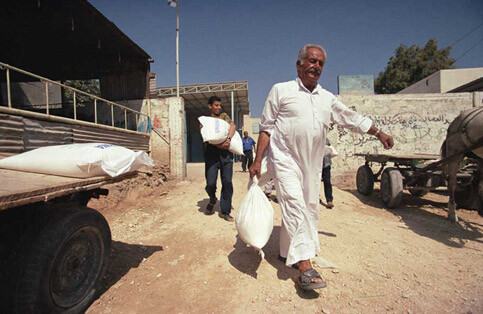World Food Programme 3 August 2004

Palestinians carry UNRWA bags at a food distribution point in Gaza (Ronald de Hommel)
ROME — Amid continuing violence and conflict in the Palestinian Territories and the resulting deprivations on the lives and livelihoods of the population, the United Nations World Food Programme announced today that it will extend its emergency operation in the Territories for a further 12 months.
Under the previous emergency operation, which ended last month, WFP provided food to more than half a million people in the Territories at a cost of US$29 million.
For the past four years people’s lives have been affected by continuing political instability, military incursions, curfews, house demolitions and a “closure policy”, with over 600 checkpoints which prevent many Palestinians from reaching their work or schools.
In addition, the construction of the 185-km “Separation Wall” that dissects the Palestinian Territories has further complicated a rapidly deteriorating economic situation.
“What is left today is not a viable economy. These are people who are struggling to survive,” said Jean-Luc Siblot, Country Director for WFP’s operations in the Territories.
“By extending our operations, WFP is demonstrating our support for those most affected by the crisis. This requires full and uninterrupted access to all our beneficiaries and free movement of food to the Territories, which is not the case today,” he added.
Under the new operation, valued at US$41 million, WFP will provide relief food distribution to 480,000 people facing severe hardship. According to WFP’s vulnerability assessment last April, an estimated 38 percent of the population is food insecure while a further 26 percent is at risk.
Within the Gaza Strip alone, food insecurity rates reached as high as 66 percent in Rafah, 56 percent in Jabalia, 40 percent in Khan Younis and 23 percent in Gaza city, added the report.
Falling incomes are another factor contributing to severe malnutrition, particularly among women and children.
“Poor households are resorting to negative coping strategies, such as selling assets, accruing debt, reducing the quantity and number of meals and cutting out on expensive foods such as meat, milk and dairy products,” Siblot said. “Unless we continue to provide food assistance, the malnutrition among the targeted population will most likely increase.”
WFP’s operations in the Territories includes “Food-for-Work”, in which participants do agricultural rehabilitation and community works, such as the rehabilitation of roads, water systems and schools and “Food-for-Training”, involving lessons in literacy, agriculture, food processing, beekeeping, ICT and boat maintenance.
“Food aid plays an important role in cushioning the effect of this humanitarian crisis,” said Siblot. “Our main aim is to sustain the livelihoods of the population,” he added.
WFP is the world’s largest humanitarian agency: in 2003 we gave food aid to a record 104 million people in 81 countries, including 56 million hungry children.
More Information
Related Links